by [email protected] | Dec 1, 2021 | Prescriptions for your Practice
Podcast: Play in new window | Download
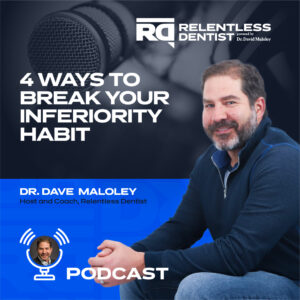 The human individual thus lives usually far within his limits; he possesses powers of various sorts which he habitually fails to use. — William James
The human individual thus lives usually far within his limits; he possesses powers of various sorts which he habitually fails to use. — William James
Did you do your best? At a glance, it’s a simple question that seems answerable by a “yes” or a “no.” Yet, if you ponder deeply, and once the complexities come into play, it can either boost your confidence or highlight your insecurities resulting in purposeless action and inferior habits.
In this episode, I’ll talk about why you need to break the habit of inferiority and recognize and integrate your wins so that you can compound your successes to generate your best year yet In 2022. If you want to know the questions you should ask yourself every night, just stay tuned.
Tune in and find solutions to common practice issues at Prescriptions for Your Practice.
Key Quotes:
- “The problem is that many of us as practice owners want to have high achievement. Well, we haven’t effectively built a skill stack and a habit stack that drives that level of performance.”
- “I believe at the core of everything we do and practice ownership, whether it be connecting to a highly anxious patient, leading team marketing, case acceptance, all of these elements, even your own belief systems and the upper limit problems you have, are all psychology based.”
- “Think about moving away from the habit of inferiority and towards a habit of excellence.”
- “Ambitious dental practice owners can set up habit-based systems that make their growth and success inevitable. So we don’t have to work so hard and be so gritty.”
- “If we understand that our days are influenced by sleep, we can understand that a great day starts the night before.”
- “We aren’t good about celebrating wins. We beat ourselves up when we don’t meet the standard. And it’s really important that we intentionally change that dialogue with ourselves.”
Featured on the Show:


by [email protected] | Nov 24, 2021 | Prescriptions for your Practice
Podcast: Play in new window | Download
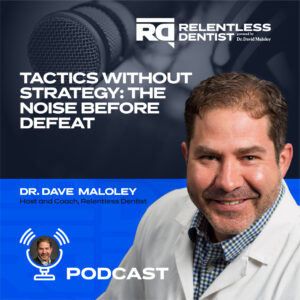 Strategy without tactics is the slowest route to victory. Tactics without strategy is the noise before defeat. — Sun Tzu
Strategy without tactics is the slowest route to victory. Tactics without strategy is the noise before defeat. — Sun Tzu
November is a big deal for me. Apart from the obvious Thanksgiving celebration, which I totally love, by the way, I always set aside this month as my year-end review — What went well this year? What didn’t go so well, where were the disappointments, and how can we do better next year?
In today’s episode, let’s talk about something that’s right up my alley. I may struggle at times with tactics, but ‘strategy’ is innate within my system. As 2022 is near approaching, I will share five grand strategies that you might consider in crafting your plans for the coming year to improve your dental practice.
You might find it too tedious a task, but if you sit down sometime between now and the end of the year and get super clear on your strategies, I am confident that you will have an extraordinary 2022.
Tune in and find solutions to common practice issues at Prescriptions for Your Practice.
Key Quotes:
- “Strategy and tactics are terms that get thrown around in practice management decisions. And sometimes there’s kind of a fuzzy, blurry line between the two, and sometimes they’re just used interchangeably, which I think is dangerous.”
- “With strategy, we have to take a long-term view, and tactics is more of a short-term view.”
- “A strategy describes the destination and how you’re going to get there.”
- “Too often, we give the business whatever it needs, and then there’s just not much energy, attention, and time left over to do the things that we really enjoy doing and be with the people we really care about and want to make memories with.”
Featured on the Show:


by [email protected] | Nov 17, 2021 | Prescriptions for your Practice
Podcast: Play in new window | Download
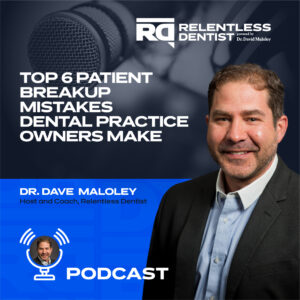 Before you tap that play button, I want you to ponder these questions first: What do patients consider when they choose their dentist? And what makes them go and explore dental services from other dentists?
Before you tap that play button, I want you to ponder these questions first: What do patients consider when they choose their dentist? And what makes them go and explore dental services from other dentists?
In medicine, research shows that 30% of patients leave the doctor’s office because of long wait times. Unfortunately, the number is higher when it comes to dental offices. The long wait times can make a patient believe that you’re in a poorly run business. And if it’s a poorly run business, you have subpar clinical standards.
In today’s episode, I will discuss the six top reasons why patients break up with dentists. Then, we will talk about patients’ perception of us and how we can maintain that in a positive frame, and how we can prevent the consequences of patient attrition. I’ll also share lessons from medical doctors’ mistakes so that you can prevent patients from even wondering if the grass is greener somewhere else. So just sit back, relax and enjoy the show.
Tune in and find solutions to common practice issues at Prescriptions for Your Practice.
Key Quotes:
- “As smart business owners, we have to manage the upside push for growth and minimize the downside. And what’s the downside when it comes to enthusing clients? I think that’s when patients leave the practice, when they break up with us, and when there’s patient attrition.”
- “Oftentimes, we’re able to maintain the relationship with the patient once they feel understood. And even if we weren’t, we can learn things that will help our processes, our systems. So as we strove to get better and better, we looked for more gems in those situations.”
- “Now urgent care is a big patient perception because what is no big deal to you might be a really big deal to patients.”
- “Patients aren’t loyal. If they’re feeling, feeling mistreated or ignored, or that you’re always running behind, they might find those greener pastures.”
- “If patients feel like they’re just a number on a spreadsheet that you’re pushing treatment on them, that you have aggressive sales tactics, that you don’t have their best interests at heart, that then they’re going to feel inclined to be a patient somewhere else.”
Featured on the Show:
- Quote: “Customers perceive service in their own unique, idiosyncratic, emotional, irrational, end-of-the-day, and totally human terms. Perception is all there is!” — Tom Peters
- I appreciate your feedback. Let me know what you learned and loved here: [email protected].


by [email protected] | Nov 10, 2021 | Prescriptions for your Practice
Podcast: Play in new window | Download
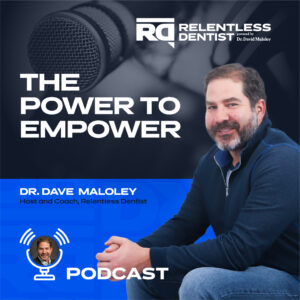
“An empowered organization is one in which individuals have the knowledge, skill, desire and opportunity to personally succeed in a way that leads to collective organizational success.” ― Stephen Covey, The 7 Habits of Highly Effective People
Pride in your work increases with freedom of choice. According to statistics, less than 1% of employees feel proud to tell others they work for an organization when the boss rarely gives them freedom of choice. However, 78% of employees feel proud to tell others about their work when the boss allows them the freedom to choose frequently.
Today’s episode will cover principles of empowerment — why most dentists want an empowered and engaged team but don’t feel confident in this quest. I’ll explain the big difference between holding your team accountable and fostering their accountability. Then, I will discuss how to make your team feel empowered and appreciate the great paradox of leadership. I will also share how Jolly Rancher and Stephen Covey’s books made a polarizing impact on my life and a personal experience on how efficiently an empowered team works during my visit with Dr. Andrew Turchin.
Tune in and find solutions to common practice issues at Prescriptions for Your Practice.
Key Quotes:
- “Too often in dentistry, we go looking for sophistication, bright shiny objects, and new and innovative wins.”
- “If you’re spending a ton of time holding your team accountable, your team will never even come close to reaching its full potential.”
- “You can only gain power by giving it away.”
- “The feeling of power or empowerment only comes from a sense of control.”
- “Personal accountability is the only true accountability.”
- “Encourage honest mistakes.”
- “The results are the only thing that pays the bill.”
- “Even if someone knows how to do their job, a lack of confidence or a fear of making mistakes will keep them from doing what needs to be done.”
- Take charge and lead the way.”
Featured on the Show:


by [email protected] | Nov 3, 2021 | Prescriptions for your Practice
Podcast: Play in new window | Download
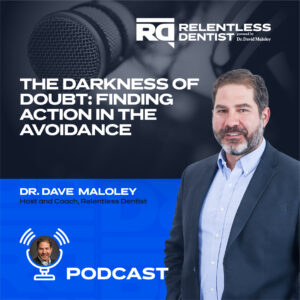 “Our doubts are traitors, and make us lose the good we oft might win, by fearing to attempt.” ― William Shakespeare, Measure for Measure
“Our doubts are traitors, and make us lose the good we oft might win, by fearing to attempt.” ― William Shakespeare, Measure for Measure
I’ll share with you my favorite story on overcoming self-doubt. This story involved my son Bennett when I felt that he was ready and decided to send him down the black run. He was scared, no doubt. But my confidence in him fueled his confidence, and after uttering a few “I can do it” mantras, he took off. We celebrated his victory over some hot chocolate, and he came up with another mantra that I use every time I need to boost my confidence. Listen in to find out.
In today’s episode, I’ll discuss how you can win the war on self-doubt. I will talk about how fear and hesitation can inhibit your progress, the 5 Cs that undermine your goals consistently, and the creative toolbox for avoiding avoidance so you can maintain professional momentum and build the practice of your dreams.
Tune in and find solutions to common practice issues at Prescriptions for Your Practice.
Key Quotes:
- “We avoid lots of things for lots of reasons, and in all of those reasons, we have embedded self-doubt.”
- “Self-doubt creates avoidance, and sometimes it sneaks upon us.”
- “Just like in dentistry, we need a diagnosis before we can create a treatment plan, and we need a treatment plan before we can create a treatment.”
- “If you grew up around people who avoided, people who were conflict avoiders, people who were worriers, then no doubt you take some of that on.”
- “Most people have a horror story at some point in time in their life. And what they do with that horror story that makes all the difference in their life.”
- “Usually, we’re trending towards the worst-case scenario that’s almost impossible to happen.”
- “In the Information Age, it’s easy to live in this delusion that I’m taking in tons of information; therefore, I must be productive.”
Featured on the Show:


 The human individual thus lives usually far within his limits; he possesses powers of various sorts which he habitually fails to use. — William James
The human individual thus lives usually far within his limits; he possesses powers of various sorts which he habitually fails to use. — William James


 Strategy without tactics is the slowest route to victory. Tactics without strategy is the noise before defeat. — Sun Tzu
Strategy without tactics is the slowest route to victory. Tactics without strategy is the noise before defeat. — Sun Tzu Before you tap that play button, I want you to ponder these questions first: What do patients consider when they choose their dentist? And what makes them go and explore dental services from other dentists?
Before you tap that play button, I want you to ponder these questions first: What do patients consider when they choose their dentist? And what makes them go and explore dental services from other dentists?
 “Our doubts are traitors, and make us lose the good we oft might win, by fearing to attempt.”
“Our doubts are traitors, and make us lose the good we oft might win, by fearing to attempt.”